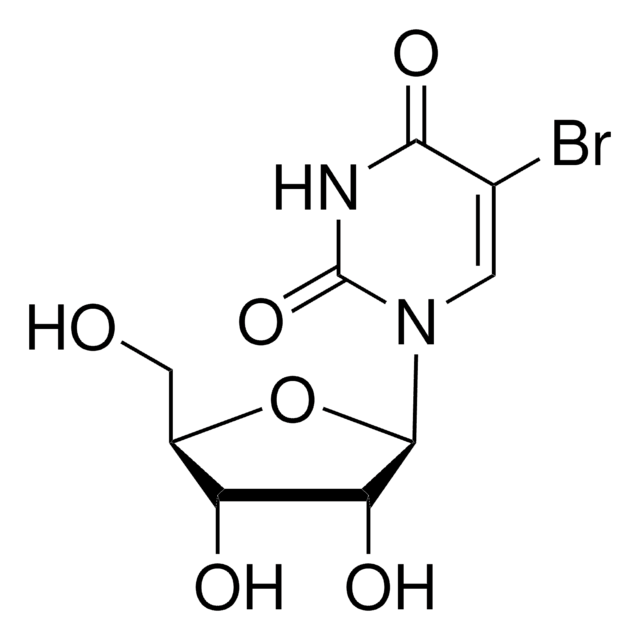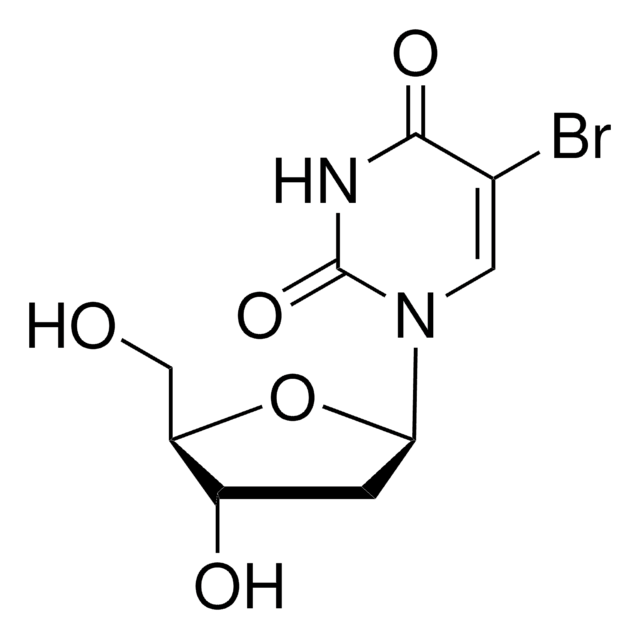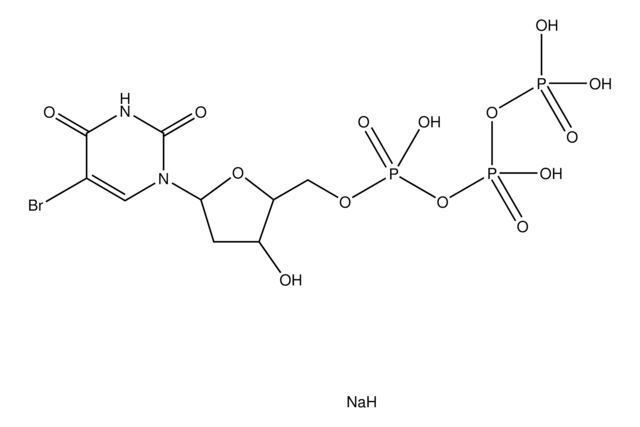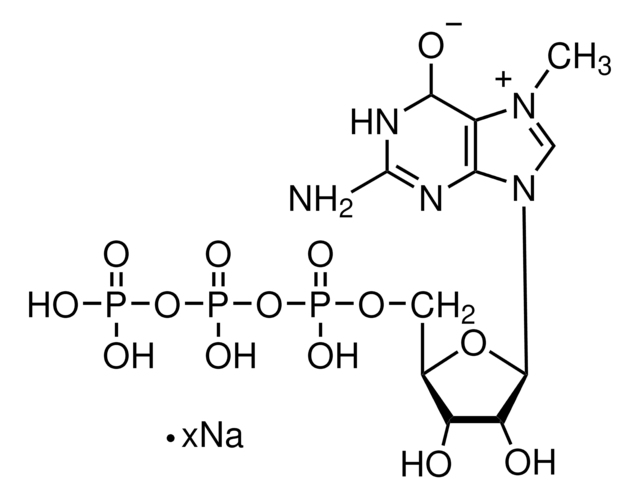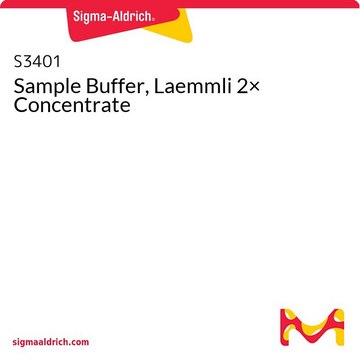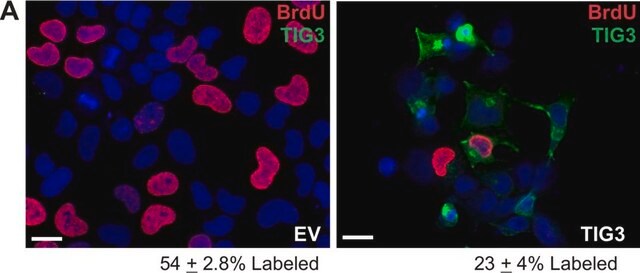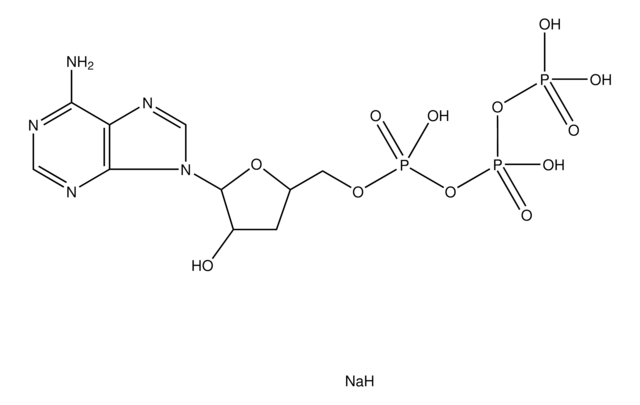B7166
5-Bromouridine 5′-triphosphate sodium salt
≥93%
Synonym(s):
5-BrUTP
Sign Into View Organizational & Contract Pricing
All Photos(1)
About This Item
Empirical Formula (Hill Notation):
C9H14BrN2O15P3 · xNa+
CAS Number:
Molecular Weight:
563.04 (free acid basis)
UNSPSC Code:
41106305
PubChem Substance ID:
NACRES:
NA.51
Recommended Products
biological source
synthetic (organic)
Quality Level
Assay
≥93%
form
powder
storage temp.
−20°C
SMILES string
OP(OP(OP(O)(O)=O)(O)=O)(OC[C@H]1O[C@@H](N(C=C2Br)C(NC2=O)=O)[C@H](O)[C@@H]1O)=O.[Na]
InChI
1S/3Na/q3*+1
InChI key
BVPYARCRLTXGBD-UHFFFAOYSA-N
General description
5-Bromouridine 5′-triphosphate (5-BrUTP) is used to measure transcription via labeling of ribonucleic acids (RNA). RNA or cells labeled via 5-BrUTP incorporation may be detected immunologically with antibodies.
Application
5-Bromouridine 5′-triphosphate (5-BrUTP) is used to measure transcription via labeling of ribonucleic acids (RNA). RNA or cells labeled via 5-BrUTP incorporation may be detected immunologically with antibodies.
5-Bromouridine 5′-triphosphate sodium salt has been used:
- to infer the chromosome intermingling between embryonic stem (ES) cells (differentiated and undifferentiated) and terminally differentiated NIH3T3 cells
- to label nascent RNA in in vivo transcription analysis using fibroblasts
- and transfected MDA-MB-231 cells
- to label RNA for nuclear run-on experiments
Signal Word
Warning
Hazard Statements
Precautionary Statements
Hazard Classifications
Eye Irrit. 2 - Skin Irrit. 2 - STOT SE 3
Target Organs
Respiratory system
Storage Class Code
11 - Combustible Solids
WGK
WGK 3
Personal Protective Equipment
dust mask type N95 (US), Eyeshields, Gloves
Choose from one of the most recent versions:
Already Own This Product?
Find documentation for the products that you have recently purchased in the Document Library.
Customers Also Viewed
Hong-Thuy Bui et al.
Reproduction (Cambridge, England), 141(1), 67-77 (2010-10-27)
Several lines of evidence indicate that the formation of a transcriptionally repressive state during the two-cell stage in the preimplantation mouse embryo is superimposed on the activation of the embryonic genome. However, it is difficult to determine the profile of
Bianca S Heinrich et al.
PLoS pathogens, 6(6), e1000958-e1000958 (2010-06-30)
Positive-strand and double-strand RNA viruses typically compartmentalize their replication machinery in infected cells. This is thought to shield viral RNA from detection by innate immune sensors and favor RNA synthesis. The picture for the non-segmented negative-strand (NNS) RNA viruses, however
Claire Tolza et al.
Molecular cancer research : MCR, 17(10), 1999-2014 (2019-07-14)
The architectural chromatin protein HMGA1 and the transcription factor Fra-1 are both overexpressed in aggressive triple-negative breast cancers (TNBC), where they both favor epithelial-to-mesenchymal transition, invasion, and metastasis. We therefore explored the possibility that Fra-1 might be involved in enhanced
Shovamayee Maharana et al.
Nucleic acids research, 44(11), 5148-5160 (2016-03-05)
Chromosome territories (CTs) in higher eukaryotes occupy tissue-specific non-random three-dimensional positions in the interphase nucleus. To understand the mechanisms underlying CT organization, we mapped CT position and transcriptional changes in undifferentiated embryonic stem (ES) cells, during early onset of mouse
Yang Wu et al.
Protein & cell, 1(5), 491-500 (2011-01-05)
Enterovirus 71 (EV71), one of the major causative agents for hand-foot-and-mouth disease (HFMD), has caused more than 100 deaths among Chinese children since March 2008. The EV71 genome encodes an RNAdependent RNA polymerase (RdRp), denoted 3D(pol), which is central for
Our team of scientists has experience in all areas of research including Life Science, Material Science, Chemical Synthesis, Chromatography, Analytical and many others.
Contact Technical Service